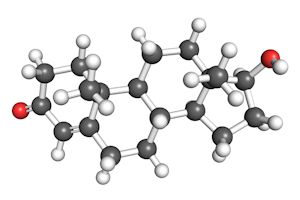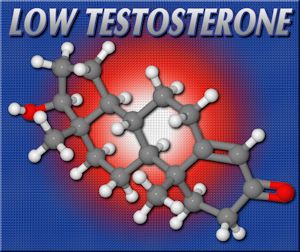Video Link: https://vimeo.com/290554581
Video Download: Click Here To Download Video
Video Stream: Click Here To Stream Video
Video Link: https://vimeo.com/290556971
Video Download: Click Here To Download Video
Video Stream: Click Here To Stream Video
Hypogonadism refers to any condition which depletes the body's ability to produce sex hormones. In the case of men, Hypogonadism refers to a suppressed ability or inability to produce Testosterone, Luteinizing Hormone, or Follicle Stimulating Hormone.
Both Luteinizing Hormone and Follicle Stimulating Hormone are necessary to produce Testosterone and Sperm. Male Hypogonadism can refer both to the inability to produce Testosterone and the inability to produce sperm

What Causes Male Hypogonadism?
There are a variety of ways that Hypogonadism can occur in males. It can be caused by genetics, trauma, or by natural aging, for example. The effects of Male Hypogonadism depend on the time in a patient's life when he experiences that deficiency.
For patients that have been diagnosed with Low-T, Hypogonadism can be treated with Testosterone Replacement Therapy. For patients with low sperm count, other treatments, such as Clomiphene Citrate or Testosterone with HCG may be the best option.
Prenatal Male Hypogonadism
Children that experience Hypogonadism in the womb experience the most severe issues related to Testosterone Deficiency. Testosterone is the sole hormone that promotes the development of male primary sexual characteristics, such as the formation of the penis and testicles, and total Testosterone Deficiency will prevent the male sexual organs from even forming.
Partial Testosterone Deficiency can leave children partially developed, but this may be treatable dependent on the level of Deficiency.
Male Hypogonadism During Puberty
Children and Adolescents that experience Hypogonadism after birth have their own set of issues. Luckily, unlike with Prenatal Hypogonadism, these issues can be treated as soon as they become apparent, with Testosterone Replacement Therapy, allowing the patient to experience puberty like normal.
Symptoms of Testosterone Deficiency During Puberty:
- Inhibited Increase in Muscle Mass
- Growth Spurt Primarily in Legs and Arms Rather than Core Body
- Testicles and Penis do not Grow Correctly
- Voice Doesn't Deepen Appropriately
- Gynecomastia
- Trouble Growing Facial and/or Body Hair
Symptoms of Testosterone Deficiency During Adulthood
After boys reach adulthood, Hypogonadism will no longer impact their physical development, but Testosterone still plays an important and integral role in optimal male health.
Men that experience Testosterone Deficiency experience a number of issues with hormone imbalance which affect them psychologically, physically, and sexually. Testosterone Replacement Therapy with Creams, Patches, or Injections can reverse these symptoms of Low-T, allowing patients to live a healthier and more normal life.
The Following Are Symptoms of Male Hypogonadism in Adulthood:
Physical Symptoms of Low-T
- Loss of Bone Mineral Density
- Gynecomastia
- Reduced Growth of Body Hair and Facial Hair
- Loss of Muscle Mass
- Infertility
- Erectile Dysfunction
- Changes in Cholesterol
- Increased Risk of Cardiovascular Complications
Psychological Symptoms of Low-T
- Loss of Libido
- Hot Flashes
- Trouble Concentrating
- Lack of Energy
- Irritability
- Depression
When Should Patients Consider Seeking Treatment for Male Hypogonadism?
For children with Male Hypogonadism, parents should have their children checked out by a pediatrician if they do not show signs of sexual maturation during puberty.
The physician can investigate and find out if the patient would benefit from Testosterone Replacement Therapy to spur secondary sexual development.

The issue with Male Hypogonadism in adulthood is that the condition shares symptoms with many other health issues. This causes many patients to delay getting the treatment that they need.
Testosterone Deficiency is also often mistaken as “simply aging,” causing men to go into a physiological decline that has little to do with aging and everything to do with Hormone Imbalance and Deficiency.
Causes of Male Hypogonadism
All patients with Male Hypogonadism can benefit from Testosterone Therapy, but the form of deficiency will impact certain treatments, such as fertility treatments.
There are two forms of hypogonadism: Primary and Secondary Hypogonadism:
Primary Hypogonadism is the result of any condition which directly impairs the function of the testicles. This is also referred to as Primary Testicular Failure.
Secondary Hypogonadism is the result of hormone imbalances which prevent the testes from getting sufficient signal to produce Testosterone and/or Sperm.
Normally, the brain promotes the production of Testosterone by sending Luteinizing Hormone from the pituitary. Follicle Stimulating Hormone, on the other hand, promotes the production of sperm. It is possible for both forms of Hypogonadism to alter a patient's sexual function simultaneously as well.
Causes of Primary Hypogonadism
Testicular Trauma – Any accident or injury which directly impacts the testicles can lead to Primary Hypogonadism by reducing the testes' physiological ability to produce sperm. Only one testicle is needed to support Testosterone and Sperm production, so in the event one is damaged, the other may be fully functional.
Cancer – Radiation, and chemotherapy both have a potentially inhibitive effect upon the normal function of the testes. In some cases, this is temporary, and normal function can be restored over the course of a few months, but in other cases, the ability of the testes to produce Testosterone or sperm may be permanently hindered.
Hemochromatosis – Elevated iron levels can inhibit the ability of the Pituitary to send Testosterone precursor hormones, and it can also directly damage the testes.
Mumps – If mumps appears on or near the testicles in childhood or later in life, this can impair the function of the testes and prevent sufficient production of Testosterone.
Undescended Testicles – Some male children, for a variety of reasons, are born without descended testicles.
This usually resolves itself naturally by the age of three, but if it does not happen naturally by this time, parents should see a pediatrician to resolve the issue in order to promote the testicles to descend by medical means in order to protect the normal function of the testes.

Klinefelter Syndrome – This is a genetic disorder in which the male is born with two X chromosomes as well as a Y chromosome.
This inhibits the individual from producing enough Testosterone to meet the needs of the body.
Causes of Secondary Hypogonadism
Obesity – Adipose fat cells have the ability to turn Testosterone produced by the testes into Estrogen. The more overweight that a man is, the less Testosterone that he will have, and the more Estrogen that will be present in the bloodstream.
This elevates the risk factors for a wide variety of cardiovascular complications.
Prescription and Non-Prescription Drugs – There are certain medications that naturally suppress the ability of the body to produce Testosterone. For example, certain medications such as Opiates inhibit the Pituitary from releasing Follicle Stimulating Hormone and Luteinizing Hormone.
Inflammatory Conditions – Any disease or chronic state which promotes the overproduction of Cortisol and other related hormones will impact the production of Testosterone. Chronic pain can severely deplete Testosterone.
Stress – The body will release Cortisol and other related hormones in response to both psychological and physical stress, which inhibits Testosterone production in the same way.
Poor Sleeping Habits – The body produces a large amount of Testosterone during deep sleep. If a patient suffers from sleep apnea or some other condition that inhibits normal sleeping patterns, Testosterone Levels will drop as a result.
Pituitary Malfunction – Any condition which affects the ability of the pituitary to produce Follicle Stimulating Hormone and Luteinizing Hormone will also impact the ability of the testes to produce testosterone and sperm. Damage to the pituitary caused by radiation treatments or tumor removal can lead to pituitary malfunction.
Kallmann Syndrome – This is a genetic disorder in which the area of the Hypothalamus that signals for Pituitary hormone production does not develop correctly, which can impair sex hormone production as well as a sense of smell. This condition also frequently causes partial color blindness.
Testosterone Deficiency and Aging
Of course, most adult males that experience Hypogonadism experience the condition as a result of the natural aging process. Around the late twenties or so, Testosterone production starts to slowly fall.
This takes many years, or even twenty years or more, to become seriously symptomatic, but it can have major effects on health, vitality, sexual function, and libido.
Different men experience Testosterone Decline differently, and a variety of factors suppress Testosterone Levels even further, such as Obesity, Smoking, Poor Sleep, and Sedentary Lifestyle.
It is estimated that almost one in three men over 75 years old suffer from significant male hypogonadism, and they could potentially benefit from treatment.
Male Hypogonadism Treatment Options
Testosterone Replacement Therapy

For Adults with Testosterone Deficiency, there are a variety of Testosterone treatment options available. Here are some of them:
- Testosterone Patches
- Testosterone Creams
- Testosterone Injections
- Testosterone Pellet Implants
- Sublingual Testosterone
- Buccal Testosterone
Testosterone with HCG
For Secondary Hypogonadism patients that are interested in maintaining Fertility, Testosterone Therapy can be combined with Human Chorionic Gonadotropin to maintain sperm production while still benefiting from supplemented Testosterone Levels.
Clomiphene Citrate / Enclomiphene Citrate
These medications are estrogen blockers that promote the production of both Follicle Stimulating Hormone and Luteinizing Hormone. These treatments can both boost Testosterone Levels and restore normal fertility.
Contact Us Today For A Free Consultation

- BioSante Pharmaceuticals, Inc. to Present at BIO Investor Forum [Last Updated On: March 16th, 2025] [Originally Added On: October 9th, 2012]
- Secondary osteoporosis: More than what meets the eye! [Last Updated On: March 16th, 2025] [Originally Added On: October 10th, 2012]
- Trimel Provides Clinical and Operational Update [Last Updated On: March 16th, 2025] [Originally Added On: October 15th, 2012]
- Obese teen boys likelier to become impotent and infertile adults [Last Updated On: March 16th, 2025] [Originally Added On: October 17th, 2012]
- Obese teen boys have up to 50 percent less testosterone than lean boys [Last Updated On: March 16th, 2025] [Originally Added On: October 17th, 2012]
- Trimel Reports Physician Market Research Results for CompleoTRT(TM) [Last Updated On: March 16th, 2025] [Originally Added On: October 24th, 2012]
- Obese teen boys likelier to turn into 'impotent' men [Last Updated On: March 16th, 2025] [Originally Added On: October 24th, 2012]
- Trimel Pharmaceuticals Corporation to Report Third Quarter 2012 Results and Host a Conference Call to Update Investors [Last Updated On: March 16th, 2025] [Originally Added On: November 2nd, 2012]
- Peer Exchange: Establishing Bone Health Clinics - Video [Last Updated On: March 16th, 2025] [Originally Added On: November 2nd, 2012]
- What is hypogonadism and how does it affect fertility? - Video [Last Updated On: March 16th, 2025] [Originally Added On: November 2nd, 2012]
- Low Testosterone in Men or Man-O-Pause - Video [Last Updated On: March 16th, 2025] [Originally Added On: November 2nd, 2012]
- Propecia (Finasteride) -- Undisclosed Mechanisms, Potential Dangers [Last Updated On: March 16th, 2025] [Originally Added On: November 2nd, 2012]
- How to Get Ripped - Why You Shouldnt Use Anabolic Steroids - Video [Last Updated On: March 16th, 2025] [Originally Added On: November 2nd, 2012]
- Future Doc: Andropause Alternatives with Dr. James Biddle Part 1 - Video [Last Updated On: March 16th, 2025] [Originally Added On: November 2nd, 2012]
- Increase Testosterone Naturally With these Diet And Workout Secrets - Video [Last Updated On: March 16th, 2025] [Originally Added On: November 2nd, 2012]
- Sector Update: Healthcare - Video [Last Updated On: March 16th, 2025] [Originally Added On: November 2nd, 2012]
- Signs And Symptoms of Hypogonadism [Last Updated On: March 16th, 2025] [Originally Added On: November 2nd, 2012]
- Auxilium and Pfizer Will Conclude Agreement on XIAPEX® EU Collaboration [Last Updated On: March 16th, 2025] [Originally Added On: November 9th, 2012]
- Repros Therapeutics Inc.(R) Reports Third Quarter 2012 Financial Results [Last Updated On: March 16th, 2025] [Originally Added On: November 14th, 2012]
- hypogonadotropic hypogonadism - Video [Last Updated On: March 16th, 2025] [Originally Added On: November 22nd, 2012]
- Research and Markets: Male Hypogonadism - Pipeline Review, H2 2012 [Last Updated On: March 16th, 2025] [Originally Added On: November 30th, 2012]
- Auxilium Pharmaceuticals, Inc. to Present At The Oppenheimer 23rd Annual Growth Conference [Last Updated On: March 16th, 2025] [Originally Added On: December 8th, 2012]
- Low Testosterone (Hypogonadism) - Part 2 - Video [Last Updated On: March 16th, 2025] [Originally Added On: December 10th, 2012]
- The National Mesothelioma Law Firm of Baron and Budd Reports on a New Drug that Could Improve the Health of ... [Last Updated On: March 16th, 2025] [Originally Added On: December 19th, 2012]
- Hypogonadism ¦ Treatment and Symptoms - Video [Last Updated On: March 16th, 2025] [Originally Added On: March 7th, 2013]
- Research and Markets: Male Hypogonadism Global Clinical Trials Review, H1, 2013 [Last Updated On: March 16th, 2025] [Originally Added On: May 1st, 2013]
- Male hypogonadism Prof Ossama Fouda - Video [Last Updated On: March 16th, 2025] [Originally Added On: May 9th, 2013]
- Low Testosterone (Hypogonadism) - Part 3 - Video [Last Updated On: March 16th, 2025] [Originally Added On: July 2nd, 2013]
- Hypogonadism - what should you do - Video [Last Updated On: March 16th, 2025] [Originally Added On: July 2nd, 2013]
- NURS805 Hypogonadism Lecture - Video [Last Updated On: March 16th, 2025] [Originally Added On: August 16th, 2013]
- Hypogonadism: MedlinePlus Medical Encyclopedia [Last Updated On: March 16th, 2025] [Originally Added On: November 3rd, 2013]
- Hypogonadism - Diseases & Conditions - Medscape Reference [Last Updated On: March 16th, 2025] [Originally Added On: November 10th, 2013]
- Hypogonadotropic hypogonadism - Wikipedia, the free encyclopedia [Last Updated On: March 16th, 2025] [Originally Added On: November 10th, 2013]
- Low Testosterone (Low-T) Normal Levels, Hypogonadism, Symptoms ... [Last Updated On: March 16th, 2025] [Originally Added On: November 15th, 2013]
- HYPOGONADISM - University of Dundee [Last Updated On: March 16th, 2025] [Originally Added On: November 23rd, 2013]
- FAQ - Hypogonadism - MEDICAL DIAGNOSIS AND MEDICINAL PLANTS [Last Updated On: March 16th, 2025] [Originally Added On: November 23rd, 2013]
- Hypogonadism - About.com Men's Health [Last Updated On: March 16th, 2025] [Originally Added On: December 2nd, 2013]
- Exciting medical advances using HRT [Last Updated On: March 16th, 2025] [Originally Added On: December 12th, 2013]
- Male hypogonadism: Symptoms - MayoClinic.com [Last Updated On: March 16th, 2025] [Originally Added On: December 12th, 2013]
- Audio-Digest Foundation Announces the Release of Oncology Volume 04, Issue 16: Highlights from Future Directions ... [Last Updated On: March 16th, 2025] [Originally Added On: December 15th, 2013]
- Hypogonadism - Medscape Reference [Last Updated On: March 16th, 2025] [Originally Added On: December 21st, 2013]
- Hypogonadism [Last Updated On: March 16th, 2025] [Originally Added On: December 23rd, 2013]
- Hypogonadism - HealthCentral [Last Updated On: March 16th, 2025] [Originally Added On: December 24th, 2013]
- Hypogonadism | Medscape - Latest Medical News, Clinical Trials ... [Last Updated On: March 16th, 2025] [Originally Added On: December 30th, 2013]
- Hypogonadism - SharedJourney [Last Updated On: March 16th, 2025] [Originally Added On: January 23rd, 2014]
- Study Finds Potential Heart Risks from Testosterone Therapy [Last Updated On: March 16th, 2025] [Originally Added On: February 3rd, 2014]
- Endocrine Society calls for large-scale studies to evaluate testosterone therapy risks [Last Updated On: March 16th, 2025] [Originally Added On: February 8th, 2014]
- Testosterone Therapy Not Always Good for Older Men [Last Updated On: March 16th, 2025] [Originally Added On: February 11th, 2014]
- Hypogonadism: Types, Causes, & Symptoms Healthline [Last Updated On: March 16th, 2025] [Originally Added On: February 14th, 2014]
- Low Testosterone (Hypogonadism) in Men - Video [Last Updated On: March 16th, 2025] [Originally Added On: February 14th, 2014]
- Hypogonadism : Types, Causes, & Symptoms - Healthline [Last Updated On: March 16th, 2025] [Originally Added On: February 17th, 2014]
- Hypogonadism | Medscape - Latest Medical News, Clinical ... [Last Updated On: March 16th, 2025] [Originally Added On: February 23rd, 2014]
- Endo: FDA Oks AVEED Injection For Treatment Of Adult Men With Hypogonadism [Last Updated On: March 16th, 2025] [Originally Added On: March 6th, 2014]
- Unit Project 1 Hypogonadotropic hypogonadism - Video [Last Updated On: March 16th, 2025] [Originally Added On: March 8th, 2014]
- Update on Endo's Product Portfolio - Analyst Blog [Last Updated On: March 16th, 2025] [Originally Added On: March 11th, 2014]
- Male hypogonadism Symptoms - Diseases and Conditions ... [Last Updated On: March 16th, 2025] [Originally Added On: April 2nd, 2014]
- Hypogonadism: Types, Causes, & Symptoms - Medical ... [Last Updated On: March 16th, 2025] [Originally Added On: April 6th, 2014]
- VLog #127 Frances Explains Hypogonadism. - Video [Last Updated On: March 16th, 2025] [Originally Added On: April 7th, 2014]
- Repros Completes Enrollment for Androxal Study - Analyst Blog [Last Updated On: March 16th, 2025] [Originally Added On: April 16th, 2014]
- Prevalence, Diagnosis and Treatment of Hypogonadism in ... [Last Updated On: March 16th, 2025] [Originally Added On: April 30th, 2014]
- Repros Therapeutics Q2 Loss a Penny Wider than Expected - Analyst Blog [Last Updated On: March 16th, 2025] [Originally Added On: August 12th, 2014]
- Repros Reports Encouraging Late-Stage Data on Androxal - Analyst Blog [Last Updated On: March 16th, 2025] [Originally Added On: August 28th, 2014]
- Repros Therapeutics Analyst Brief Report; Androxal(R) Achieves Superiority in Top Line Analysis by Small Cap Street ... [Last Updated On: March 16th, 2025] [Originally Added On: September 30th, 2014]
- The Wall Street Journal: Repros Therapeutics shares drop on drug application setback [Last Updated On: March 16th, 2025] [Originally Added On: October 18th, 2014]
- Apricus expands development pipeline with in-licensing of US rights for fispemifene [Last Updated On: March 16th, 2025] [Originally Added On: October 21st, 2014]
- Apricus expands development pipeline with the in-licensing of US rights for fispemifene, a phase 2b ready asset, from ... [Last Updated On: March 16th, 2025] [Originally Added On: October 21st, 2014]
- Hypogonadism No Moustache! No Beard!! [Last Updated On: March 16th, 2025] [Originally Added On: October 28th, 2014]
- Male Hypogonadism: Male Reproductive Endocrinology: Merck ... [Last Updated On: March 16th, 2025] [Originally Added On: October 28th, 2014]
- Hypogonadism Wikipedia [Last Updated On: March 16th, 2025] [Originally Added On: October 28th, 2014]
- Urology Care Foundation - Urology A-Z - Low Testosterone [Last Updated On: March 16th, 2025] [Originally Added On: November 3rd, 2014]
- Will Repros (RPRX) Miss Estimates This Earnings Season? - Analyst Blog [Last Updated On: March 16th, 2025] [Originally Added On: November 5th, 2014]
- Hypogonadism in men living with HIV - Video [Last Updated On: March 16th, 2025] [Originally Added On: November 7th, 2014]
- Male Hypogonadism Therapeutic Pipeline Industry Review, H2 2014 - Video [Last Updated On: March 16th, 2025] [Originally Added On: November 7th, 2014]
- Testosterone Deficiency (Hypogonadism) Overview ... [Last Updated On: March 16th, 2025] [Originally Added On: November 23rd, 2014]
- Endo to Acquire Rights to Testosterone Nasal Gel Natesto - Analyst Blog [Last Updated On: March 16th, 2025] [Originally Added On: November 26th, 2014]
- Male hypogonadism pathophysiology - Video [Last Updated On: March 16th, 2025] [Originally Added On: January 14th, 2015]
- Auxilium Announces Results from Special Meeting of Stockholders [Last Updated On: March 16th, 2025] [Originally Added On: January 28th, 2015]
- What is Hypogonadism - Symptoms and Treatment | Hormone ... [Last Updated On: March 16th, 2025] [Originally Added On: January 30th, 2015]
- Male Hypogonadism 1/28/15 - Video [Last Updated On: March 16th, 2025] [Originally Added On: January 31st, 2015]
- Male hypogonadism: symptoms, cause, treatment, risk ... [Last Updated On: March 16th, 2025] [Originally Added On: February 18th, 2015]
Word Count: 1473




















